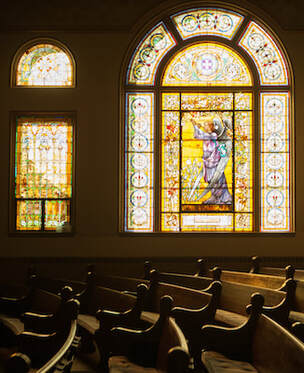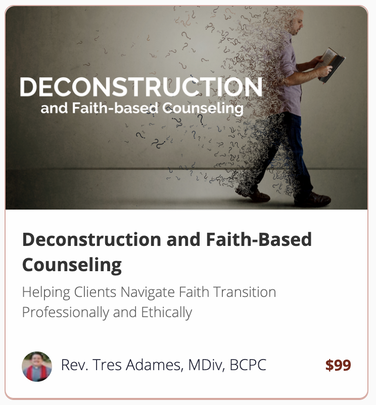|
by Rev. Tres Adames, MDiv, BCPC
How pastors, families, and churches can be there for those who are deconstructing
In the summer of last year, well-known evangelical pastor, David Jeremiah, declared that those leaving evangelicalism (termed "Exvangelicals") could be an indication of the beginning of the end times. While this was merely speculative, and might have intended to help current believers feel better about what they were seeing, this approach does little to build empathy with those who have already felt hurt by the church. The posture of a Christian (especially pastors) should be one of compassion and understanding, not othering (especially demonizing) those who think differently than we do. It also seems counter to the evangelical message itself. We should pursue and love others, especially when they have genuine questions around God, faith, and their purpose and direction in life.
1. Many people who are experiencing a deconstruction of their faith don't even want to deconstruct. Questioning one's faith can be an emotionally exhaustive process that may lead a person to a place where they feel like they may lose their church, their family, and their friends. There's a lot on the line so try to be sensitive to this. Many have previously been ardent believers, faithful givers, and actively involved in their local church.
2. If someone is honest with you about their doubts, view it as an act of bravery.
Many people who are deconstructing are afraid of being rejected by people who have been close to them for years. Many are afraid of simply being labeled a "backslider." Even if they don't experience this reaction, they still may not be completely comfortable with spiritual conversations if they feel like they might be misunderstood. Try to listen more than you speak.

4. Don't push them into reconstruction.
While deconstruction can be a precursor toward the reconstruction of a deeper, more vibrant faith, the process is so incredibly unique to each person. It's tempting to suggest that they should "still focus on Jesus" or not "throw out the baby with the bath water," but some people may need to go through a season where they step away from faith altogether, especially if they have trauma around religion or if they experienced abuse in the church. Such tragedy can deeply affect a person's perception and experience of God, so they may need to distance themselves so they can disentangle and heal.
6. Do your own introspection as a leader and as a church.
None of this means that you have to deconstruct yourself. If it's distressing to talk to someone who is deconstructing, it might be time to work on yourself. Asking yourself (and your church) some hard questions can be incredibly valuable. I've listed some ideas below. These questions are less about finding concrete answers and more about what you discover as a result of having these conversations:
About Tres Adames
Rev. Tres Adames is a Board Certified Pastoral Counselor and provides resources on the subject of deconstruction in the following areas:
New Course on Deconstruction for Counselors and Therapists
Comments are closed.
|
Article Topics
All
Archives
July 2023
|
We're ready to help. Let's begin.
Peoria LocationInside State Farm
9299 W Olive Ave Ste 212 Peoria AZ 85345 |
Phoenix LocationInside CrossRoads UMC
7901 N Central Ave Phoenix AZ 85020 |
About |
Services |
EducationPrograms
ACPE Spiritual Care Specialist Pastoral Counseling Apprenticeship Deconstruction Course Free Grief Training Contact |
We're ready to help. Let's begin.
© 2024 Prism Counseling & Coaching. All Rights Reserved.
Christian DISC® is a registered trademark of Prism Counseling & Coaching.
Christian DISC® is a registered trademark of Prism Counseling & Coaching.



